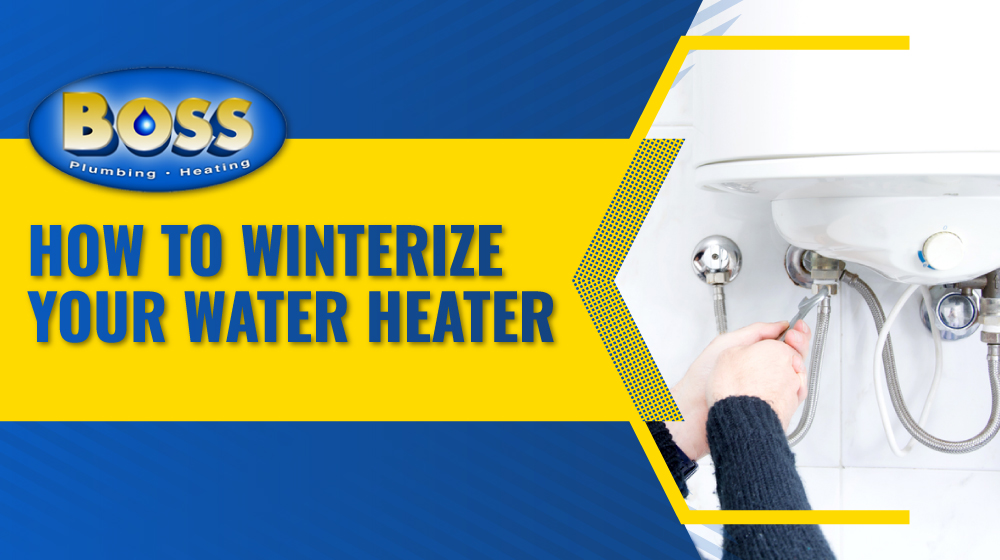
Winterize Water Heater
When the temperature starts to drop outside and you start seeing snowflakes in the air, you know winter has indeed arrived. While you may be thinking mostly about your heating and cooling system and making sure various parts of your home are properly insulated, you also need to make winter water heater maintenance a top priority. By doing so, you can help keep your energy costs down and also ensure your water heater won’t let you down when you need it the most. As for how to winterize your water heater, here are some of our best tips for water heater maintenance for fall and winter, courtesy of our experts here at Boss Plumbing.
Why Should You Winterize Your Water Heater?
Like many of our customers here in Los Angeles, you’re probably wondering why you even need to winterize your water heater. Actually, there are a variety of reasons.
If you happen to have a gas water heater in your home, the cold temperatures could create problems concerning your water heater’s pilot light going out much too frequently. Since the water heater is usually located in your basement or utility room, these are areas of your home that are often colder than other areas. Should temperatures dip too low, the cold temps and drafts from a lack of insulation can have your water heater’s pilot light regularly going out, creating an inconvenience as well as a lack of hot water.
It’s also possible that during an especially cold winter, the cold temps outside could actually lead to your water heater freezing. Should this occur, it could lead to your water heater leaking from the top or bottom, potentially causing water damage to your home. If it is too badly frozen, it could also damage certain components inside the water heater that could lead to you needing water heater repair services or perhaps even the installation of a new water heater if your water heater was old or making noises that indicated it was already experiencing problems prior to freezing.
Should All Types of Water Heaters be Winterized?
Whether you have a gas or electric water heater or have decided to make the conversion from a tank to a tankless water heater, we here at Boss Plumbing feel it is important to winterize your water heater, no matter its type. This will be especially important if you will be spending the winter somewhere else and thus have your home being empty for an extended period of time.
No matter what type of water heater you have, winterizing it will make it much less likely you will experience frozen pipes inside your home, whether it is occupied during the winter or empty.
Generally, the process is the same when it comes to winterizing your home’s water heater. However, keep in mind that it may be a bit more important if you have a gas or electric water heater that is an actual tank, since a tankless water heater does not contain a large amount of water at any given time. When you have a gas water heater, winterizing it will not only make it easier to keep the pilot light on, but also make sure the water heater’s gas lines do not get too cold and possibly freeze. If this happens, it’s always possible a gas leak could develop, which could prove to be dangerous for you and your family.
How Do You Winterize a Home Water Heater?
If you have never winterized your home’s water heater before, you may think it is a long and complex process. In actuality, our team here at Boss Plumbing knows this type of water heater maintenance is actually very easy to do for most homeowners.
One of the first things you should do is check the temperature and pressure relief valve. Too much pressure can result in leaks, shorten the water heater’s lifespan, or even put it at risk of exploding. By shutting off the heater’s water supply and power and lifting the valve’s tab so that some water can escape, you’ll know the valve is working as it should.
You should also inspect the water heater’s anode rod, which is made to attract corrosion and thus keep your water heater’s interior from rusting. If this rod has rusted down to where it is less than 1/2 inch in diameter, you’ll need a new one. These can be purchased at any hardware store and can be easily installed as a DIY project.
We here at Boss Plumbing also recommend you inspect your water heater thermocouple for signs of damage. This is crucial if you have a gas water heater, since this is a safety device that helps to restrict the flow of gas to your heater. If it appears to be corroded, it should be either cleaned or replaced so that it will provide maximum protection for your water heater.
If you know you won’t be in your home much during the winter or have investment property that will be empty, we can’t stress enough the importance of turning off your water heater. But before doing so, we also suggest you flush the tank to rid it of any sediment that has built up at the bottom. As added protection, you can also insulate the tank with a foil insulation blanket. By cutting it to fit around valves and pipes, you can wrap it around the water heater, tape it securely, and know your water heater will be safe and sound throughout the winter.
Contact Us for Winterizing Help
Whether it’s your tankless water heater that needs service or the need to have a new electric water heater installed before winter, contact us here at Boss Plumbing for all your water heater winterizing needs. With our 30+ years of experience, fast and dependable service, and affordable pricing, you’ll have the best plumbers in Los Angeles taking care of your water heater.
